Educational psychology
Assignment 1: 3 texts + argumentation (2 lectures)
Assignment 2: Develop research proposal (Group feedback + collective feedback (poster))
- Identify a relevant educational psychological research question that (as far as you know) was not
answered yet, and justify why it deserves an answer
- Design a research proposal that can provide an answer to this question
- Final draft is max 5 pages long (including references, excluding appendices), in font size 12, normal
margins
- Support:
o 2 feedback moments for individual groups
First moment:
A provisional text of 2-4 pages
Only on identification of research gap, research question, rationale (but NOT on
method!)
o 1 collective poster session (peer feedback) 19 januari
- Submission of intermediate and final drafts in Toledo
Assignment 3: Review research proposal
Critical discussion of reader (part 1)
→ Not summarising texts (or discussing one by one)
→ Discuss readings of the texts → possible dimensions/criteria
→ Why this is an important text and a good text
Conclusion of all classes
I. Topics that receive a lot of attention (deserved or not?)
- I this attention deserved? Overstudies/understudied?
II. Object of research? (too simple, too complex?)
- Witch focus do these studies take? Too much, to specific?
III. Involvement in practice
- Implications for quality of learning
IV. View on learning (and teaching)
I. Topics that receive a lot of attention (deserved or not?)
Where are the texts about?
- Transfer: apply what you have learned to another setting
- Domain specific focus:
o Arithmetic, mathematics (more rational, objective, easier to measure if it is learned)
o Science education
o Language acquisition
(but not special interest groups on that → they are intertwined)
- Prior knowledge
- Assessment and evaluation: alle texts that measure learning outcomes (measure if they learning)
- Methods in learning research: how do you study something and witch conclusions can you take
, II. Object of research? (too simple, too complex?)
Choosing is loosing
Educational psychology
- Berliner
o Human teaching and learning
o Empirical study of phenomena
o Psychological methods and concepts
Schwab (1973, The practical): Educational psychology
- Someone teaches something to somebody in some setting
o = very complex
o Consequences: over simplification, fragmentation, niches
Simplification: Ignoring the complexity
Fragmentation/niches: Ignoring everything else
Someone teaches Something
Teacher (can be done by teacher) By media (e,g. computer) Curricular areas
• Training • Still or moving pictures • Math
• Intelligence • Speech or written text • Reading
• Ethnicity • Animations • Physics
• Classroom actions • Learner control or not? • Athletics
• Beliefs, attitudes • (Which) feedback? Specific areas
• Personality traits • Intersection points of
• Domain specific knowledge quadratic functions
• Content-specific knowledge • A specific spelling rule
To somebody = learner In a certain setting • Ohm’s law
(child, pupil, student, teacher, adult) • Service in tennis
• Prior education • Classroom Generic skills
• Intelligence • Home • Problem solving skills
• Ethnicity • Workplace • Metacognitive skills
• Gender • Individual vs. team • Collaboration skills
• Social background, SES • Shared knowledge, • Information skills
• Beliefs, attitudes distributed knowledge • Critical thinking
• Personality traits • Daily life (vs. school)
• Motivation
• Metacognition
Vosniadou: Conceptual change theory
- Many learning processes are continuous
o Biology: distinction mammals, birds, reptiles, …
o Physics: matter can be solid, fluid, gas depending on temperature
o Math: Multiplication up to 1000 (instead of 100)
o Math : addition and subtraction
o Math : percentages (when knowing fractions)
→ Learning by “additive” mechanisms / “enrichment” of knowledge
- Ideas get more general, abstract, widely applicable
Conceptual change theory:
- Children pick up information very early → deep-rooted presuppositions
o Can support or hinder learning
- When hindering: learning = “revolution”
o Discontinuous learning → conceptual change needed
o Your initial knowledge is wrong and you need to replace this knowledge




